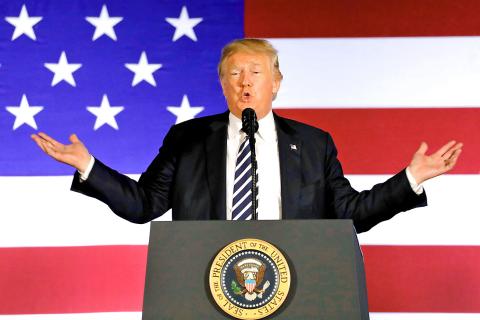US President Donald Trump is to skip two major summits in Asia in November, a move that could stoke concerns in the region about the US’ reliability as a counterweight to China.
The White House on Friday said that US Vice President Mike Pence would travel to Singapore for an 18-member ASEAN summit, before heading to Papua New Guinea for an APEC gathering.
The APEC summit is normally attended by 21 leaders, including Chinese President Xi Jinping (習近平) and Russian President Vladimir Putin.

Photo: Reuters
The decision removes one potential avenue for Trump to meet with Xi as a trade war between the US and China deepens. Both leaders are expected to attend the G20 summit in Argentina later in November.
Trump’s absence is also likely to fuel concerns among Asian leaders who want the US to push back against China’s increasing economic and military might.
Trump administration officials have been promoting a new “Indo-Pacific” strategy to bolster its commitment to the region, after Trump withdrew from the Trans-Pacific Partnership (TPP) trade deal and questioned the cost of security alliances with Japan and South Korea.
“His absence would doubtlessly solidify the impression that America has essentially abandoned its traditional presence in the Asia-Pacific, not to mention the non-starter Indo-Pacific,” said Oh Ei Sun (胡逸山), a senior adviser for international affairs at the Asian Strategy and Leadership Institute in Kuala Lumpur.
Without Trump, Xi would have more space to advocate Chinese trade and development projects, such as his ambitious Belt and Road Initiative.
Xi was the first leader to confirm his attendance to the APEC meeting in Port Moresby, Papua New Guinea, where he also plans to host his own summit with Pacific leaders.
Although US leaders have attended the events over the past few years, missing them is not unprecedented.
In 2007, then-US president George W. Bush drew flak for rescheduling a planned meeting with ASEAN leaders in Singapore. Former US president Barack Obama, whose administration announced a pivot in military and diplomatic resources to Asia, in 2013 skipped APEC to handle a government shutdown.
Newly installed Australian Prime Minister Scott Morrison during a trip to Jakarta yesterday told reporters that Trump’s decision to tend to matters at home was understandable and Pence “speaks with the authority of the [US] president.”
The Singaporean Ministry of Foreign Affairs welcomed Pence’s visit to the city-state, adding in a statement that it would be his first as US vice president.
The Asian summits come days after midterm US Congressional elections, which could determine Trump’s ability to withstand investigations into Russian campaign interference and election-season payments to alleged mistresses.
While US Democratic Party leaders have largely avoided talking about impeaching Trump, Republican losses in the US House of Representatives or Senate would greatly increase the risk of congressional action.
Collin Koh Swee Lean (高瑞連), a research fellow at the S. Rajaratnam School of International Studies in Singapore, said that efforts by US officials in the region should help offset Trump’s absence.
US Secretary of State Michael Pompeo at an ASEAN meeting last month announced US$300 million in regional security funding and the US military is among nine nations participating in the ongoing annual Southeast Asia Cooperation and Training exercises in Singapore.

A magnitude 7.0 earthquake struck off Yilan at 11:05pm yesterday, the Central Weather Administration (CWA) said. The epicenter was located at sea, about 32.3km east of Yilan County Hall, at a depth of 72.8km, CWA data showed There were no immediate reports of damage. The intensity of the quake, which gauges the actual effect of a seismic event, measured 4 in Yilan County area on Taiwan’s seven-tier intensity scale, the data showed. It measured 4 in other parts of eastern, northern and central Taiwan as well as Tainan, and 3 in Kaohsiung and Pingtung County, and 2 in Lienchiang and Penghu counties and 1

FOREIGN INTERFERENCE: Beijing would likely intensify public opinion warfare in next year’s local elections to prevent Lai from getting re-elected, the ‘Yomiuri Shimbun’ said Internal documents from a Chinese artificial intelligence (AI) company indicated that China has been using the technology to intervene in foreign elections, including propaganda targeting Taiwan’s local elections next year and presidential elections in 2028, a Japanese newspaper reported yesterday. The Institute of National Security of Vanderbilt University obtained nearly 400 pages of documents from GoLaxy, a company with ties to the Chinese government, and found evidence that it had apparently deployed sophisticated, AI-driven propaganda campaigns in Hong Kong and Taiwan to shape public opinion, the Yomiuri Shimbun reported. GoLaxy provides insights, situation analysis and public opinion-shaping technology by conducting network surveillance

‘POLITICAL GAME’: DPP lawmakers said the motion would not meet the legislative threshold needed, and accused the KMT and the TPP of trivializing the Constitution The Legislative Yuan yesterday approved a motion to initiate impeachment proceedings against President William Lai (賴清德), saying he had undermined Taiwan’s constitutional order and democracy. The motion was approved 61-50 by lawmakers from the main opposition Chinese Nationalist Party (KMT) and the smaller Taiwan People’s Party (TPP), who together hold a legislative majority. Under the motion, a roll call vote for impeachment would be held on May 19 next year, after various hearings are held and Lai is given the chance to defend himself. The move came after Lai on Monday last week did not promulgate an amendment passed by the legislature that

Taiwan is gearing up to celebrate the New Year at events across the country, headlined by the annual countdown and Taipei 101 fireworks display at midnight. Many of the events are to be livesteamed online. See below for lineups and links: Taipei Taipei’s New Year’s Party 2026 is to begin at 7pm and run until 1am, with the theme “Sailing to the Future.” South Korean girl group KARA is headlining the concert at Taipei City Hall Plaza, with additional performances by Amber An (安心亞), Nick Chou (周湯豪), hip-hop trio Nine One One (玖壹壹), Bii (畢書盡), girl group Genblue (幻藍小熊) and more. The festivities are to